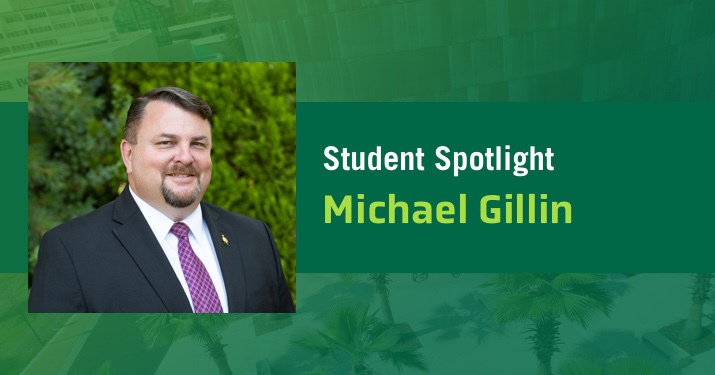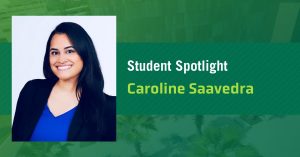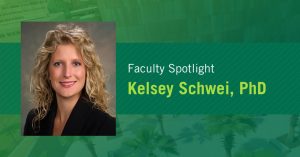Mike Gillin was unsure what career he wanted when he grew up – but he knew he was interested in science and literature. He took that love of science and followed it to a computer science degree. After college, he worked at IBM for 16 years, first in the IT finance division and later for IBM Global Services, where he collaborated with professionals across continents and managed a trans-continental team. Later, he transitioned to a Long Island community hospital, where he found his passion – healthcare IT.
“While my background is in IT, I really found a passion for my career when I focused on healthcare IT. The ability to use my IT talents to better serve people and make a difference in the world has really driven me to want to go further,” Gillin said.
To advance his career potential in the healthcare IT field, Gillin pursued a 100% online Master of Science in Health Informatics with a SAS-approved concentration in Healthcare Analytics from USF Health’s Morsani College of Medicine. He graduated in May 2020 and places a high value on the education he received in the program.
“Even though I already have a well-established career, I was drawn to get my master’s as an indication of my dedication and passion for this field,” he said. “I believe it’s part of continuing education that is critical in both healthcare and information technology.”
Online Flexibility and School Reputation Were Key Influencers
Gillin said he looked for a reputable program that could provide flexibility for his hectic schedule.
“Working full time and going back to school, I was looking for a program that gave me the flexibility to maintain a good work-life balance, and the ability to schedule my time accordingly,” he said. Unfortunately, the workday is not always predictable, and when supporting healthcare, especially in a community hospital, you can’t just walk away when things need to get done.”
USF Health’s Morsani College of Medicine also became a viable option because he could pursue his master’s in health informatics and dive deeper into healthcare analytics with a graduate certificate. Plus, the credit hours for the healthcare analytics graduate certificate counted toward his full graduate degree
“When I started to look at programs, there were a few areas where this program stuck out. First, being a 100% online was a major draw,” Gillin said. “The course selection met with my desires to mix the analytics along with the healthcare-related coursework. The Morsani College of Medicine has a great reputation, and the faculty involved in the program are leaders in their respective fields and have the real-life experience to contribute to what may be in a textbook.”
Faculty Expertise and Practical Teaching
Throughout the program, Gillin said he bonded with two USF faculty members in particular – Dr. Michael Barber and Megan Monroe, J.D., M.A. Monroe’s Legal Aspects of Health Information Management course provided Gillin with interesting assignments and discussions on legal aspects of health informatics.
“I have always had an interest in law and seeing how it applies to healthcare information in greater detail in more ways than merely HIPAA was very interesting,” he said.
Gillin also found Dr. Barber’s e-Healthcare Ethics course valuable, particularly when the effects of the Coronavirus pandemic began to impact his New York-area hospital.
“While our hospital was not in the epicenter and more on the periphery, we still saw the impacts of the pandemic, and quickly had to double our capacity. This meant long hours at work, and in many ways very mentally and emotionally draining times,” Gillin said.
“Focusing on that last class was a challenge,” he said. “Luckily, it was a class I really enjoyed. What amazed me was the amount of feedback that was provided on a weekly basis. Assignments and discussions were always graded quickly and returned with thorough notes on your strong points, things to consider, and other areas to explore. In some ways, [the course] dovetailed perfectly into the real-life challenges at the time.”
Looking to the Future
Gillin said he is eager to share his knowledge with others.
“One of the benefits of working in a small community hospital is the amount of interaction I have with staff at the hospital, both support staff and clinical staff. I want to do my best for them because I know if I am able to provide them with the tools and information they need, they can better serve our patients and our community. There is something to be said for that direct connection to the community, to the patients, and to the staff.”
After completing his degree, Gillin said he’s also looking ahead toward new opportunities and goals within his reach.
“I would like to continue the path I am currently on and hopefully become a Chief Information Officer at some point. Regardless of the title though, I would like to be in a position where I can be a thought leader, and help to lead an organization, mentor others in healthcare IT, and share what I have learned. I have also considered teaching at some point, but we will need to see what happens there,” he said.
Explore What USF Health Has to Offer
Gillin said that one of his most valuable takeaways from the MSHI Healthcare Analytics program was the excitement that came from sharing experiences with people that shared his passion.
“What surprised me most was how quickly I was able to become acquainted with other students. Even though we were geographically distanced, connections were quickly made, and I looked forward to reconnecting with people in the next class.”
Gillin advised anyone who may be considering this program to be excited for the challenges ahead, plan out your schedule, and be accountable to yourself.
“If you are serious about a career in healthcare informatics, this is a great program,” he said. “If you plan accordingly, and bring your ‘A’ game, you will get a lot out of this program.”



